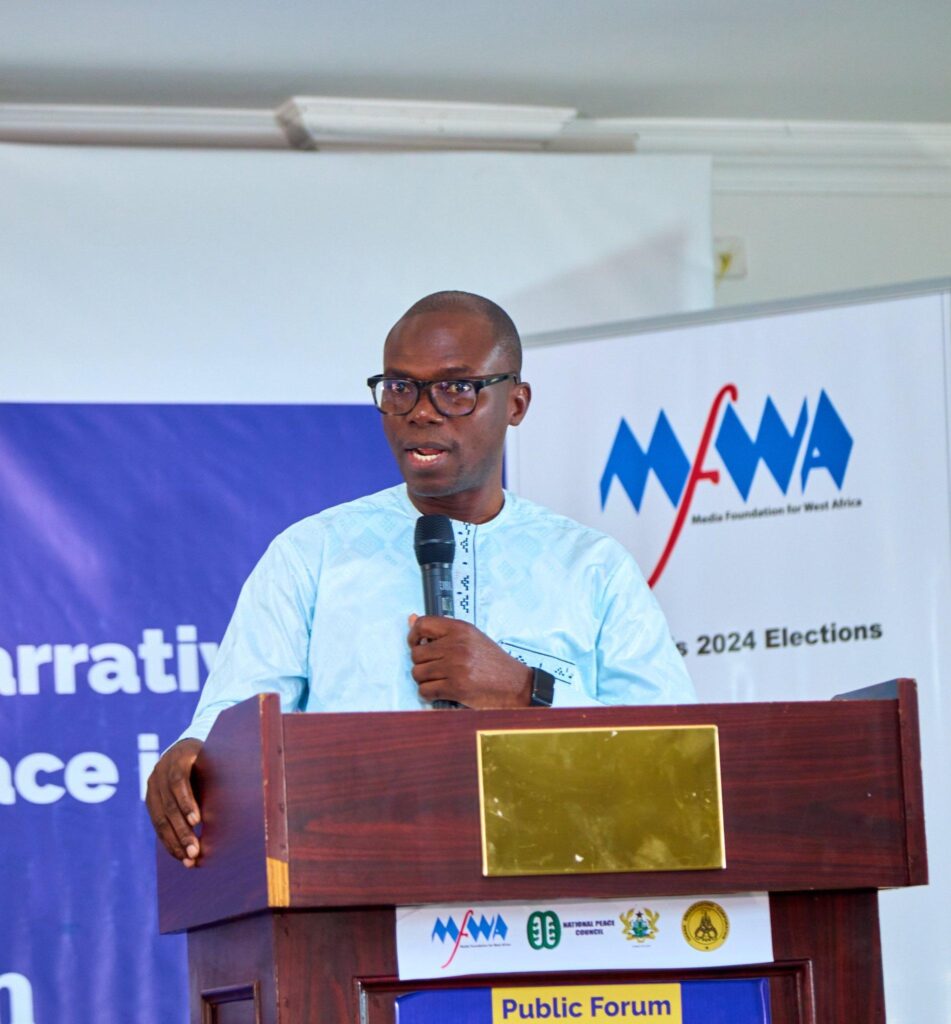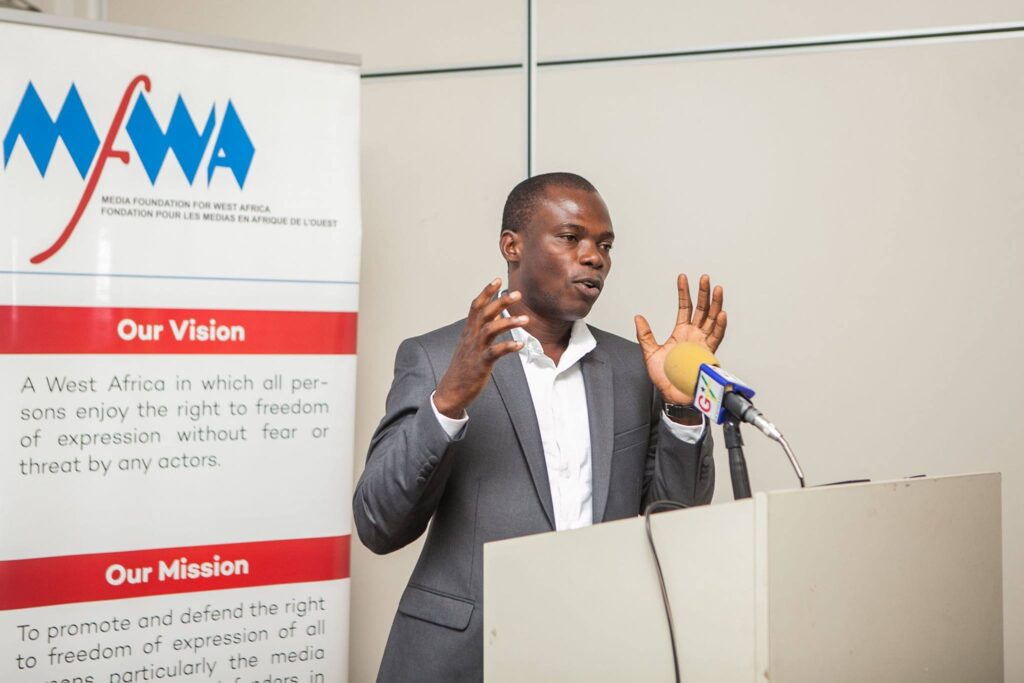The enduring scandal surrounding “ghost names” within Ghana’s National Service Scheme (NSS) continues to draw sharp criticism and demands for accountability.
At the forefront of this scrutiny is Sulemana Braimah, Executive Director for the Media Foundation for West Africa (MFWA), who has vehemently rejected attempts to solely blame NSS staff for the fraudulent enrollment of thousands of non-existent personnel.
Mr Braimah, in a detailed analysis, contended that the problem lies not merely with human actors but with fundamental flaws in the digital platform dubbed “Metric App“ and the operational contract underpinning it.
Mr Braimah expressed astonishment at the arguments suggesting the digital platform was not the core issue, particularly when such arguments emanate from the very top.
“Surprisingly, those who make this argument include the current Director General of the National Service Authority (NSA), Felix Gyamfi. Before I go on to the substantive points, it is important to point out that the current Director General was a staff member (in fact, a District Director) of the NSS/NSA until his appointment this year.
“So he was within the NSS/NSA when the scheme was populated with thousands of ghost names, costing the nation hundreds of millions of cedis. He wasn’t appointed from outside.”
Sulemana Braimah, Executive Director for Media Foundation for West Africa
Mr Braimah then systematically dismantled the argument that NSS staff, rather than the digital platform, were solely responsible for the ghost names.

Central Service Management Portal
He presented a series of compelling facts regarding the Central Service Management Portal (CSMP), the digital platform at the heart of the controversy, developed and managed by Inpath Technologies Ghana Ltd.
Firstly, the contract stipulated a comprehensive role for the service provider, noting that Inpath Technologies was tasked with developing the CSMP for a wide array of functions.
These include the submission of graduate lists by schools, online national service enrollment, automated PIN code and NSS number generation, automated identity verification of service personnel, online retrieval of posting information and letters, and crucially, monitoring and verification of personnel presence at work to justify payment.
According to Mr Braimah, the broad mandate of the digital platform requires it to be a robust, end-to-end solution for managing the entire national service process.
However, Mr Braimah’s subsequent points reveal a critical operational structure that, he argued, made the service provider uniquely responsible for the platform’s integrity.
“The Service Provider was not to, and did not, build the CSMP platform and hand it over to the NSS/NSA. The Service Provider was the builder, operator, maintainer and custodian of the digital platform”.
Sulemana Braimah, Executive Director for Media Foundation for West Africa
According to Mr Braimah, this meant that the Service Provider was at all times responsible for how the platform functioned and operated, with “No one could or was allowed to make any functional changes to the platform except the Service Provider.”
“The Service Provider was at all times the one controlling the full back-end access to the platform. No one could get access to the back-end of the platform without authorisation by the Service Provider.”
Sulemana Braimah, Executive Director for Media Foundation for West Africa
Widespread Fraud
This level of control, Mr Braimah noted, implies that any widespread fraudulent activity occurring on the platform would require either the complicity or gross negligence of the service provider.
Mr Braimah further reinforced this by noting that the Service provider was the only entity/person who could block any person(s) from the DG to the cleaner at NSS/NSA, from having access to the platform.

Drawing directly from the contract, Mr Braimah emphasised that the Service Provider was explicitly required to ensure that the platform possessed robust web security to prevent it from what the contract refers to as ‘malicious intrusions.
He then posed a rhetorical but pointed question: “I suppose inclusion of thousands of ghost names will be a malicious intrusion.” According to him, the contract also mandated that if the Service Provider became aware of a security breach, it was obligated to notify NSS, detailing the breach, its occurrence, and the steps taken to remedy it and prevent future recurrences.
This contractual obligation forms the basis of Mr Braimah’s core challenge to the service provider’s accountability.
“When the Service Provider became aware of the ghost names breach year after year, what steps did they take to remedy the situation? If the situation was remedied, why did the ghost names continue for several years on the same platform?
“If not the Service Provider who had exclusive full access rights, who granted the necessary back-end access rights that made it possible for NSS staff to enrol fake personnel without a Ghana Card?”.
Sulemana Braimah, Executive Director for Media Foundation for West Africa
He also questioned who granted access for people to use ordinary papers and company ID cards in place of Ghana Card to enrol as service personnel, and “who granted the access to allow for the 80 and 90-year-olds to be enrolled for national service, and who granted access for the fake index numbers to be inputted on the platform?”
Integrity of Metric App
Finally, Mr Braimah challenged the very integrity of the platform itself, directly questioning the current Director General’s defence of it.
“Was and is the platform so porous that anything at all was/is allowed to be put in by those who had/have access to input any data at all? If so, is that the platform the current DG, Felix Gyamfi, is defending as robust?
“Even if the platform was/is so porous that it allows for any fraudulent activities to be carried out, what was the service provider’s obligation as the operator of the platform in terms of ensuring the integrity of the platform? What did the service provider do to prevent the fraud from continuing?”
Sulemana Braimah, Executive Director for Media Foundation for West Africa

Sulemana Braimah’s detailed exposition effectively shifts the narrative, suggesting that the “ghost names” scandal is not simply a matter of corrupt individuals manipulating a sound system but rather a deeper problem rooted in the design, operation, and security of the digital platform itself, as managed by its exclusive service provider.
His analysis calls for a thorough re-evaluation of accountability, extending beyond the NSS staff to encompass the entities responsible for the technical infrastructure meant to prevent such widespread fraud.
READ ALSO: BOST National Fuel Reserves Critically Low, COMAC Warns




















